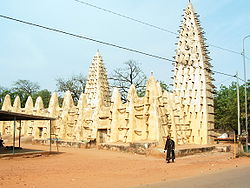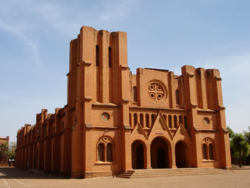- Religion in Burkina Faso
-
Exact statistics on religion in Burkina Faso are approximate because Islam and Christianity are consistently practiced in tandem with indigenous religious beliefs, the Government of Burkina Faso stated in its most recent census (2006) that 60.5% of the population practice Islam, and that the majority of this group belong to the Sunni branch,[1][2] while a growing minority adheres to the Shi'a branch. A significant numbers of Sunni Muslims identify with the Tijaniyah Sufi order. The Salafi/Wahhabi extremism is of recent arrival in the area, and appeals largely to the young.[citation needed] The Government also estimated that 19 percent practices Catholicism, 15.3% follow Traditional indigenous beliefs, 4.2% are members of various Protestant denominations, 0.6% have other religions and 0.4% have none.[2][1]
Contents
Statistics
A popular saying in Burkina Faso claims that "50% are Muslim, 50% are Christian and 100% are animist". This shows the large level of acceptance of the various religions amongst each other. Even for Muslims and Christians, ancient animist rites are still highly valued. The Great Mosque of Bobo-Dioulasso was built by people of all faiths working together.
Statistics on religious affiliation are approximate because Syncretism, incorporating traditional indigenous beliefs and practices, is widespread among both Christians and Muslims.[2] The majority of citizens practice traditional indigenous religious beliefs to varying degrees, and strict adherence to Christian and Muslim beliefs is often nominal.[2] Almost all citizens are believers and atheism is virtually nonexistent.
Geography
Muslims reside largely around the northern, eastern, and western borders, while Christians live in the center of the country.[2] People practice traditional indigenous religious beliefs throughout the country, especially in rural communities.[2] Ouagadougou, the capital, has a mixed Muslim and Christian population; however, Bobo-Dioulasso, the country's second largest city, is mostly Muslim.[2] Small Syrian and Lebanese immigrant communities reside in the 2 largest cities and are overwhelmingly (more than 90 percent) Christian.[2]
Ethnicity
There are more than 60 different ethnicities in the country.[2] Most ethnic groups are religiously heterogeneous, although the Fula and Dioula communities are majority Muslim.[2]
See also
References
- ^ a b Comité national du recensement (july 2008). "Recensement général de la population et de l'habitation de 2006". Conseil national de la statistique. http://cns.bf/IMG/pdf/Depliant_Resultats_Definitifs_du_RGPH_2006.pdf. Retrieved 20 January 2011.
- ^ a b c d e f g h i j International Religious Freedom Report 2010: Burkina Faso. United States Bureau of Democracy, Human Rights and Labor (November 17, 2010). This article incorporates text from this source, which is in the public domain.
Religion in Africa Buddhism · Christianity · Hinduism · Islam · Judaism · Traditional religions Sovereign states Algeria · Angola · Benin · Botswana · Burkina Faso · Burundi · Cameroon · Cape Verde · Central African Republic · Chad · Comoros · Democratic Republic of the Congo · Republic of the Congo · Côte d'Ivoire (Ivory Coast) · Djibouti · Egypt · Equatorial Guinea · Eritrea · Ethiopia · Gabon · The Gambia · Ghana · Guinea · Guinea-Bissau · Kenya · Lesotho · Liberia · Libya · Madagascar · Malawi · Mali · Mauritania · Mauritius · Morocco · Mozambique · Namibia · Niger · Nigeria · Rwanda · Sahrawi Arab Democratic Republic · São Tomé and Príncipe · Senegal · Seychelles · Sierra Leone · Somalia · South Africa · South Sudan · Sudan · Swaziland · Tanzania · Togo · Tunisia · Uganda · Zambia · ZimbabweDependencies,
autonomies and
other territoriesCanary Islands (Spain) · Ceuta (Spain) · Madeira (Portugal) · Mayotte (France) · Melilla (Spain) · Puntland · Réunion (France) · St. Helena (UK) · Socotra (Yemen) · Somaliland · Western Sahara · Zanzibar (Tanzania) Burkina Faso topics
Burkina Faso topicsHistory Geography Politics President · Prime Minister · Government · Political parties · Elections · Constitution · Foreign relations · Military · Law enforcement · Human rights (LGBT rights)Economy Agriculture · Energy · Tourism · West African CFA franc · Communications · Companies · Mining · Transport · Trade unions · HealthDemographics Culture Portal Categories:
Wikimedia Foundation. 2010.


